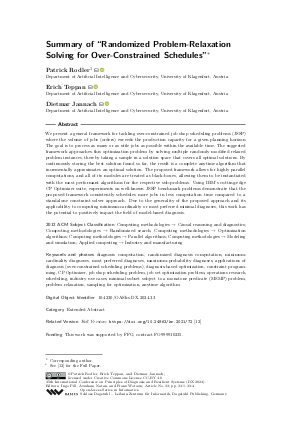Summary of "Randomized Problem-Relaxation Solving for Over-Constrained Schedules" (Extended Abstract)
Authors
Patrick Rodler  ,
Erich Teppan
,
Erich Teppan  ,
Dietmar Jannach
,
Dietmar Jannach 
-
Part of:
Volume:
35th International Conference on Principles of Diagnosis and Resilient Systems (DX 2024)
Part of: Series: Open Access Series in Informatics (OASIcs)
Part of: Conference: International Conference on Principles of Diagnosis and Resilient Systems (DX) - License:
 Creative Commons Attribution 4.0 International license
Creative Commons Attribution 4.0 International license
- Publication Date: 2024-11-26
File

PDF
OASIcs.DX.2024.33.pdf
- Filesize: 483 kB
- 4 pages
Document Identifiers
Related Versions
- Full Version https://doi.org/10.24963/kr.2021/72
Subject Classification
ACM Subject Classification
- Computing methodologies → Causal reasoning and diagnostics
- Computing methodologies → Randomized search
- Computing methodologies → Optimization algorithms
- Computing methodologies → Parallel algorithms
- Computing methodologies → Modeling and simulation
- Applied computing → Industry and manufacturing
Keywords
- diagnosis computation
- randomized diagnosis computation
- minimum-cardinality diagnoses
- most preferred diagnoses
- maximum-probability diagnoses
- applications of diagnosis (over-constrained scheduling problems)
- diagnosis-based optimization
- constraint programming
- CP Optimizer
- job shop scheduling problem
- job set optimization problem
- operations research
- scheduling
- industry use cases
- minimal subset subject to a monotone predicate (MSMP) problem
- problem relaxation
- sampling for optimization
- anytime algorithm
Metrics
- Access Statistics
-
Total Accesses (updated on a weekly basis)
0PDF Downloads0Metadata Views
Abstract
We present a general framework for tackling over-constrained job shop scheduling problems (JSSP) where the volume of jobs (orders) exceeds the production capacity for a given planning horizon. The goal is to process as many or as utile jobs as possible within the available time. The suggested framework approaches this optimization problem by solving multiple randomly modified relaxed problem instances, thereby taking a sample in a solution space that covers all optimal solutions. By continuously storing the best solution found so far, the result is a complete anytime algorithm that incrementally approximates an optimal solution. The proposed framework allows for highly parallel computations, and all of its modules are treated as black-boxes, allowing them to be instantiated with the most performant algorithms for the respective sub-problems. Using IBM’s cutting-edge CP Optimizer suite, experiments on well-known JSSP benchmark problems demonstrate that the proposed framework consistently schedules more jobs in less computation time compared to a standalone constraint solver approach. Due to the generality of the proposed approach and its applicability to computing minimum-cardinality or most preferred minimal diagnoses, this work has the potential to positively impact the field of model-based diagnosis.
Cite As Get BibTex
Patrick Rodler, Erich Teppan, and Dietmar Jannach. Summary of "Randomized Problem-Relaxation Solving for Over-Constrained Schedules" (Extended Abstract). In 35th International Conference on Principles of Diagnosis and Resilient Systems (DX 2024). Open Access Series in Informatics (OASIcs), Volume 125, pp. 33:1-33:4, Schloss Dagstuhl – Leibniz-Zentrum für Informatik (2024)
https://doi.org/10.4230/OASIcs.DX.2024.33
BibTex
@InProceedings{rodler_et_al:OASIcs.DX.2024.33,
author = {Rodler, Patrick and Teppan, Erich and Jannach, Dietmar},
title = {{Summary of "Randomized Problem-Relaxation Solving for Over-Constrained Schedules"}},
booktitle = {35th International Conference on Principles of Diagnosis and Resilient Systems (DX 2024)},
pages = {33:1--33:4},
series = {Open Access Series in Informatics (OASIcs)},
ISBN = {978-3-95977-356-0},
ISSN = {2190-6807},
year = {2024},
volume = {125},
editor = {Pill, Ingo and Natan, Avraham and Wotawa, Franz},
publisher = {Schloss Dagstuhl -- Leibniz-Zentrum f{\"u}r Informatik},
address = {Dagstuhl, Germany},
URL = {https://drops.dagstuhl.de/entities/document/10.4230/OASIcs.DX.2024.33},
URN = {urn:nbn:de:0030-drops-221259},
doi = {10.4230/OASIcs.DX.2024.33},
annote = {Keywords: diagnosis computation, randomized diagnosis computation, minimum-cardinality diagnoses, most preferred diagnoses, maximum-probability diagnoses, applications of diagnosis (over-constrained scheduling problems), diagnosis-based optimization, constraint programming, CP Optimizer, job shop scheduling problem, job set optimization problem, operations research, scheduling, industry use cases, minimal subset subject to a monotone predicate (MSMP) problem, problem relaxation, sampling for optimization, anytime algorithm}
}
Author Details
- Department of Artificial Intelligence and Cybersecurity, University of Klagenfurt, Austria
- Department of Artificial Intelligence and Cybersecurity, University of Klagenfurt, Austria
Funding
This work was supported by FFG, contract FO999910235.
References
- Philippe Baptiste. On minimizing the weighted number of late jobs in unit execution time open-shops. EJOR, 149(2):344-354, 2003. URL: https://doi.org/10.1016/S0377-2217(02)00759-2.
-
Jacek Blazewicz, Klaus H. Ecker, Erwin Pesch, Günter Schmidt, Malgorzata Sterna, and Jan Weglarz. Handbook on Scheduling: From Theory to Practice. Springer, 2019.

-
Giacomo Da Col and Erich C. Teppan. Industrial size job shop scheduling tackled by present day CP solvers. In Principles and Practice of Constraint Programming (CP), 2019.

- Michael Garey, David Johnson, and Ravi Sethi. The complexity of flowshop and jobshop scheduling. Math. Oper. Res., 1(2):117-129, 1976. URL: https://doi.org/10.1287/MOOR.1.2.117.
-
Joao Marques-Silva, Mikoláš Janota, and Anton Belov. Minimal sets over monotone predicates in boolean formulae. In Int'l Conf. on Computer Aided Verification (CAV), 2013.

- Raymond Reiter. A theory of diagnosis from first principles. Artif. Intell., 32(1):57-95, 1987. URL: https://doi.org/10.1016/0004-3702(87)90062-2.
- Patrick Rodler. A formal proof and simple explanation of the QuickXplain algorithm. Artif. Intell. Rev., 55(8):6185-6206, 2022. URL: https://doi.org/10.1007/S10462-022-10149-W.
- Patrick Rodler. Memory-limited model-based diagnosis. Artif. Intell., 305:103681, 2022. URL: https://doi.org/10.1016/J.ARTINT.2022.103681.
-
Patrick Rodler. Random vs. Best-First: Impact of Sampling Strategies on Decision Making in Model-Based Diagnosis. In AAAI Conf. on Artificial Intelligence (AAAI), 2022.

-
Patrick Rodler. How should I compute my candidates? A taxonomy and classification of diagnosis computation algorithms. In European Conf. on Artificial Intelligence (ECAI), 2023.

- Patrick Rodler and Erich Teppan. The scheduling job-set optimization problem: A model-based diagnosis approach. In Int’l Workshop on Principles of Diagnosis (DX), 2020. arXiv:2009.11142. URL: https://arxiv.org/abs/2009.11142.
- Patrick Rodler, Erich Teppan, and Dietmar Jannach. Randomized problem-relaxation solving for over-constrained schedules. In Int’l Conf. on Principles of Knowledge Representation and Reasoning (KR), 2021. URL: https://doi.org/10.24963/kr.2021/72.
- Linus Schrage. A more portable Fortran random number generator. TOMS, 5(2):132-138, 1979. URL: https://doi.org/10.1145/355826.355828.
-
Kostyantyn Shchekotykhin, Gerhard Friedrich, Patrick Rodler, and Philipp Fleiss. Sequential diagnosis of high cardinality faults in knowledge-bases by direct diagnosis generation. In European Conf. on Artificial Intelligence (ECAI), 2014.

-
Eric Taillard. Benchmarks for basic scheduling problems. EJOR, 64(2):278-285, 1993.

